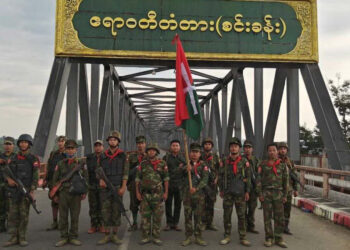Myanmar’s regime says it is building a national database to monitor citizens and identify its opponents.
The regime’s media said it formed a committee to build a database last year headed by deputy junta chief Soe Win.
The committee will establish an electronic identification system that cannot be influenced by foreign organizations and governments.
At a meeting on October 6, Soe Win said the database will boost national security, the rule of law and peace.
Brigadier General Myat Min Oo, the junta’s information and technology department chief, attended the meeting, according to the junta reports.
Following the 2021 coup, the regime distributed photos and information to airports, border crossings and police stations about civil servants who refused to work under military rule and artists, journalists and politicians who opposed the regime.
Pro-junta Telegram channels and other online sites published the addresses and photos of dissidents and junta critics, calling for their arrest.
Ma Wai Phyo Myint, Myanmar’s head of Access Now, a global advocacy group for digital rights, said: “The national database has immigration data. The regime can match the information on household registration certificates, citizenship IDs and passports. This makes it easy for the regime to identify a person, their address, family and networks.
“It requires people to register their SIM cards to reveal their contacts from the telecoms operator. If an activist is arrested, all their contacts can also be seized,” she added.
“The junta traces our digital footprints. And it has been building a database to find out all the information about individuals in a few seconds. This digital coup is taking shape and we must work to prevent the regime from getting the technology to make it happen.”
More than 1,300 people have been arrested since the coup for online comments, Data for Myanmar reported on October 8.
Myanmar was named as having the second-worst environment for internet freedom after China, according to the “Freedom on the Net” report published by Freedom House on October 4.
The regime is seeking Chinese and Indian help to implement an electronic identification system, which the junta claims has details for 52 million citizens and more than 13 million households.
The regime is collecting biometric data and will issue a unique ID when the process is complete, the media reported.
The junta’s Ministry of Immigration and Population is implementing the electronic identification system. Immigration minister Myint Kyaing recently flew to Delhi and Beijing to study his allies’ technology.
In India he observed Aadhaar, the world’s largest biometric ID system, and explored the potential for cooperation with Myanmar’s new database.
He was in China last month to meet Xu Ganglu, the deputy National Immigration Administration minister, to discuss cooperation between the immigration agencies.
He also visited Beijing’s Hisign Technology company, which describes itself as “one of the most comprehensive and technologically advanced enterprises in China’s multi-biometric industry”.

















